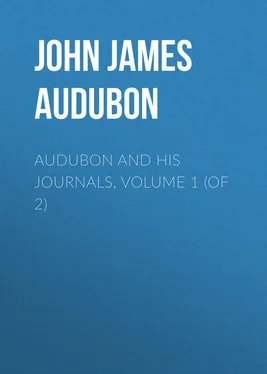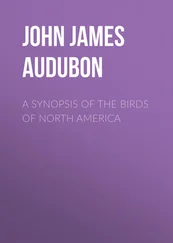John Audubon - Audubon and his Journals, Volume 1 (of 2)
Здесь есть возможность читать онлайн «John Audubon - Audubon and his Journals, Volume 1 (of 2)» — ознакомительный отрывок электронной книги совершенно бесплатно, а после прочтения отрывка купить полную версию. В некоторых случаях можно слушать аудио, скачать через торрент в формате fb2 и присутствует краткое содержание. Жанр: foreign_antique, foreign_prose, на английском языке. Описание произведения, (предисловие) а так же отзывы посетителей доступны на портале библиотеки ЛибКат.
- Название:Audubon and his Journals, Volume 1 (of 2)
- Автор:
- Жанр:
- Год:неизвестен
- ISBN:нет данных
- Рейтинг книги:5 / 5. Голосов: 1
-
Избранное:Добавить в избранное
- Отзывы:
-
Ваша оценка:
- 100
- 1
- 2
- 3
- 4
- 5
Audubon and his Journals, Volume 1 (of 2): краткое содержание, описание и аннотация
Предлагаем к чтению аннотацию, описание, краткое содержание или предисловие (зависит от того, что написал сам автор книги «Audubon and his Journals, Volume 1 (of 2)»). Если вы не нашли необходимую информацию о книге — напишите в комментариях, мы постараемся отыскать её.
Audubon and his Journals, Volume 1 (of 2) — читать онлайн ознакомительный отрывок
Ниже представлен текст книги, разбитый по страницам. Система сохранения места последней прочитанной страницы, позволяет с удобством читать онлайн бесплатно книгу «Audubon and his Journals, Volume 1 (of 2)», без необходимости каждый раз заново искать на чём Вы остановились. Поставьте закладку, и сможете в любой момент перейти на страницу, на которой закончили чтение.
Интервал:
Закладка:
Were I here to tell you that once, when travelling, and driving several horses before me laden with goods and dollars, I lost sight of the pack-saddles, and the cash they bore, to watch the motions of a warbler, I should only repeat occurrences that happened a hundred times and more in those days. To an ordinary reader this may appear very odd, but it is as true, my dear sons, as it is that I am now scratching this poor book of mine with a miserable iron pen. Rozier and myself still had some business together, but we became discouraged at Louisville, and I longed to have a wilder range; this made us remove to Henderson, one hundred and twenty-five miles farther down the fair Ohio. We took there the remainder of our stock on hand, but found the country so very new, and so thinly populated that the commonest goods only were called for. I may say our guns and fishing-lines were the principal means of our support, as regards food.
John Pope, our clerk, who was a Kentuckian, was a good shot and an excellent fisherman, and he and I attended to the procuring of game and fish, while Rozier again stood behind the counter.
Your beloved mother and I were as happy as possible, the people round loved us, and we them in return; our profits were enormous, but our sales small, and my partner, who spoke English but badly, suggested that we remove to St. Geneviève, on the Mississippi River. I acceded to his request to go there, but determined to leave your mother and Victor at Henderson, not being quite sure that our adventure would succeed as we hoped. I therefore placed her and the children under the care of Dr. Rankin and his wife, who had a fine farm about three miles from Henderson, and having arranged our goods on board a large flatboat, my partner and I left Henderson in the month of December, 1810, in a heavy snow-storm. This change in my plans prevented me from going, as I had intended, on a long expedition. In Louisville we had formed the acquaintance of Major Croghan (an old friend of my father's), and of General Jonathan Clark, the brother of General William Clark, the first white man who ever crossed the Rocky Mountains. I had engaged to go with him, but was, as I have said, unfortunately prevented. To return to our journey. When we reached Cash Creek we were bound by ice for a few weeks; we then attempted to ascend the Mississippi, but were again stopped in the great bend called Tawapatee Bottom, where we again planted our camp till a thaw broke the ice. 13 13 Episode "Breaking of the Ice."
In less than six weeks, however, we reached the village of St. Geneviève. I found at once it was not the place for me; its population was then composed of low French Canadians, uneducated and uncouth, and the ever-longing wish to be with my beloved wife and children drew my thoughts to Henderson, to which I decided to return almost immediately. Scarcely any communication existed between the two places, and I felt cut off from all dearest to me. Rozier, on the contrary, liked it; he found plenty of French with whom to converse. I proposed selling out to him, a bargain was made, he paid me a certain amount in cash, and gave me bills for the residue. This accomplished, I purchased a beauty of a horse, for which I paid dear enough, and bid Rozier farewell. On my return trip to Henderson I was obliged to stop at a humble cabin, where I so nearly ran the chance of losing my life, at the hands of a woman and her two desperate sons, that I have thought fit since to introduce this passage in a sketch called "The Prairie," which is to be found in the first volume of my "Ornithological Biography."
Winter was just bursting into spring when I left the land of lead mines. Nature leaped with joy, as it were, at her own new-born marvels, the prairies began to be dotted with beauteous flowers, abounded with deer, and my own heart was filled with happiness at the sights before me. I must not forget to tell you that I crossed those prairies on foot at another time, for the purpose of collecting the money due to me from Rozier, and that I walked one hundred and sixty-five miles in a little over three days, much of the time nearly ankle deep in mud and water, from which I suffered much afterward by swollen feet. I reached Henderson in early March, and a few weeks later the lower portions of Kentucky and the shores of the Mississippi suffered severely by earthquakes. I felt their effects between Louisville and Henderson, and also at Dr. Rankin's. I have omitted to say that my second son, John Woodhouse, was born under Dr. Rankin's roof on November 30, 1812; he was an extremely delicate boy till about a twelvemonth old, when he suddenly acquired strength and grew to be a lusty child.
Your uncle, Thomas W. Bakewell, had been all this time in New Orleans, and thither I had sent him almost all the money I could raise; but notwithstanding this, the firm could not stand, and one day, while I was making a drawing of an otter, he suddenly appeared. He remained at Dr. Rankin's a few days, talked much to me about our misfortunes in trade, and left us for Fatland Ford.
My pecuniary means were now much reduced. I continued to draw birds and quadrupeds, it is true, but only now and then thought of making any money. I bought a wild horse, and on its back travelled over Tennessee and a portion of Georgia, and so round till I finally reached Philadelphia, and then to your grandfather's at Fatland Ford. He had sold my plantation of Mill Grove to Samuel Wetherell, of Philadelphia, for a good round sum, and with this I returned through Kentucky and at last reached Henderson once more. Your mother was well, both of you were lovely darlings of our hearts, and the effects of poverty troubled us not. Your uncle T. W. Bakewell was again in New Orleans and doing rather better, but this was a mere transient clearing of that sky which had been obscured for many a long day.
Determined to do something for myself, I took to horse, rode to Louisville with a few hundred dollars in my pockets, and there purchased, half cash, half credit, a small stock, which I brought to Henderson. Chemin faisant , I came in contact with, and was accompanied by, General Toledo, then on his way as a revolutionist to South America. As our flatboats were floating one clear moonshiny night lashed together, this individual opened his views to me, promising me wonders of wealth should I decide to accompany him, and he went so far as to offer me a colonelcy on what he was pleased to call "his Safe Guard." I listened, it is true, but looked more at the heavens than on his face, and in the former found so much more of peace than of war that I concluded not to accompany him.
When our boats arrived at Henderson, he landed with me, purchased many horses, hired some men, and coaxed others, to accompany him, purchased a young negro from me, presented me with a splendid Spanish dagger and my wife with a ring, and went off overland toward Natchez, with a view of there gathering recruits.
I now purchased a ground lot of four acres, and a meadow of four more at the back of the first. On the latter stood several buildings, an excellent orchard, etc., lately the property of an English doctor, who had died on the premises, and left the whole to a servant woman as a gift, from whom it came to me as a freehold. The pleasures which I have felt at Henderson, and under the roof of that log cabin, can never be effaced from my heart until after death. The little stock of goods brought from Louisville answered perfectly, and in less than twelve months I had again risen in the world. I purchased adjoining land, and was doing extremely well when Thomas Bakewell came once more on the tapis, and joined me in commerce. We prospered at a round rate for a while, but unfortunately for me, he took it into his brain to persuade me to erect a steam-mill at Henderson, and to join to our partnership an Englishman of the name of Thomas Pears, now dead.
Читать дальшеИнтервал:
Закладка:
Похожие книги на «Audubon and his Journals, Volume 1 (of 2)»
Представляем Вашему вниманию похожие книги на «Audubon and his Journals, Volume 1 (of 2)» списком для выбора. Мы отобрали схожую по названию и смыслу литературу в надежде предоставить читателям больше вариантов отыскать новые, интересные, ещё непрочитанные произведения.
Обсуждение, отзывы о книге «Audubon and his Journals, Volume 1 (of 2)» и просто собственные мнения читателей. Оставьте ваши комментарии, напишите, что Вы думаете о произведении, его смысле или главных героях. Укажите что конкретно понравилось, а что нет, и почему Вы так считаете.












